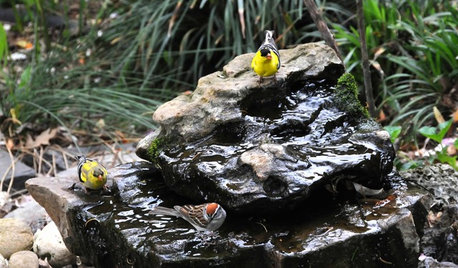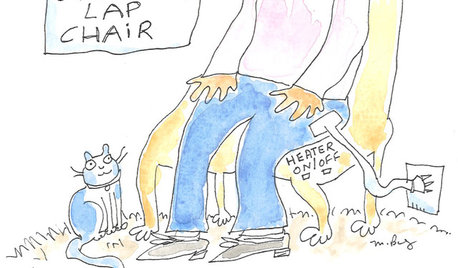Megane - Question about spaying/neutering
labmomma
17 years ago
Related Stories

PETSSo You Want to Get a Cat
If you're a cat lover, the joys outweigh any other issue. If you haven't lived with one yet, here are a few things to know
Full Story
OUTDOOR PROJECTSBring In the Birds With a Homemade Bubble Rock
An avian expert from Southern Indiana shows how to make a burbling fountain that migrating birds will love
Full Story
PETSSee a Deluxe 'Catio' Built for Feline Fun
Sixteen lucky cats get the run of a protected outdoor patio with ramps, steps and even a koi pond
Full Story
FEEL-GOOD HOME6 Design Ideas for Happy Pets
Keep your dog or cat feeling safe and in high spirits, and you'll all feel more at peace. Here's how
Full Story
GARDENING FOR BUTTERFLIESGarden for Wildlife to Reap Rich Rewards
When you plant with animals and insects in mind, you make gardening easier, the planet healthier and yourself more present
Full Story
LIFEHow to Outsmart Backyard Critters
Learn to think like a raccoon, skunk or squirrel to keep your home safe and your garden intact
Full Story
DREAM SPACESA Car Lover's Man Cave Kicks Into High-Luxury Gear
Fast cars, fine wines and a high-tech bathroom elevate this backyard outpost to the realm of dream space
Full Story
PETSHouzz TV: Watch These Rescued Cats Make a House Their Playland
Spirals, catwalks, tunnels and platforms create a superhighway inside this home in Southern California
Full Story
FUN HOUZZIf Cats Could Design
Ever wonder what your cat might dream up as an architect or interior designer? Here's a peek
Full Story






dobesrule
Meghane
Related Professionals
Keansburg Architects & Building Designers · Seattle Architects & Building Designers · South Elgin Architects & Building Designers · Washington Interior Designers & Decorators · Fountain Furniture & Accessories · Sudbury Furniture & Accessories · Christiansburg Cabinets & Cabinetry · Parsippany Cabinets & Cabinetry · Spring Valley Cabinets & Cabinetry · Carlsbad Flooring Contractors · Lincolnia Flooring Contractors · Summerville Flooring Contractors · Town and Country Flooring Contractors · West Islip Flooring Contractors · Englewood Flooring ContractorslabmommaOriginal Author
dobesrule
beeanne
mboston_gw
labmommaOriginal Author
dobesrule
beeanne
donna_loomis
labmommaOriginal Author
Datdog
labmommaOriginal Author
Datdog
labmommaOriginal Author
dobesrule
Meghane
labmommaOriginal Author
share_oh
labmommaOriginal Author
Datdog
labmommaOriginal Author
jenme
labmommaOriginal Author
cindyandmocha
beeanne
Meghane
labmommaOriginal Author
share_oh
cjhwillis
labmommaOriginal Author
cindyandmocha
buyorsell888
labmommaOriginal Author
cindyandmocha
labmommaOriginal Author
beeanne